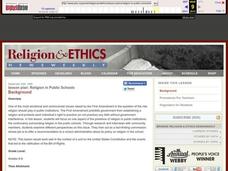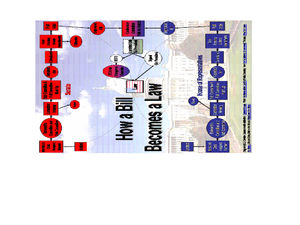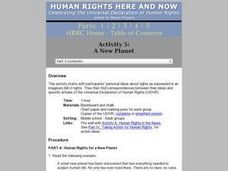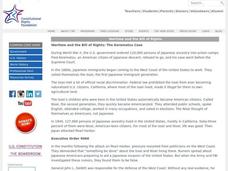Curated OER
Japanese Internment
Eleventh graders read about and discuss the Japanese Internment of World War II. In this Japanese Internment lesson, 11th graders examine the Japanese Internment. They talk about the civil rights aspect, how they would deal with being...
Curated OER
Religion in Public Schools
Seventh graders conduct research on important background information regarding the role of religion in American public schools. In this Ethics instructional activity, 7th graders examine and become familiar with the First Amendment of...
Curated OER
On the Other Side of the Color Barrier: Segregation and the Negro Leagues
Students study segregation that occurred in the past and that is currently occurring. In this equal rights lesson, students use primary source documents to student segregation of the past. In a culminating activity, students find or draw...
Curated OER
Perseverance and the First Amendment
Students investigate the right to petition and assemble. In this Bill of Rights lesson, students read the First Amendment and discuss the rights guaranteed by the amendment. Students research selected groups and movements that have...
Curated OER
How Government Works and the Rights of the People
Eighth graders identify how to be responsible citizens. In this civics lesson, 8th graders review websites of congressional members and then create questionnaires about the responsibilities of citizens.
Curated OER
Nothing to Fear but Fear Itself
Students investigate the years during World War II in which Japanese Americans living on the West Coast were held in internment camps.
Curated OER
The Supreme Court
Learners examine the Fourteenth Amendment. For this Supreme Court lesson, students define due process and equal protection as they analyze the impact of the amendment and the Supreme Court on workers' rights in the early 20th century....
Curated OER
Reconstruction
Pupils describe the period of Reconstruction. Then students describe the concept of sharecropping. They complete a vocabulary prediction confirmation activity for the vocabulary words from the passage.
Curated OER
Susan B. Anthony and the 19th Amendment
High schoolers take a closer look at the Women's Suffrage Movement in America. In this women's rights lesson, students research suffrage leaders and write papers about them. High schoolers then read and discuss information...
Curated OER
A New Planet
Students, in gorups, develop a Bill of rRghts for a newly discovered planet. They give the planet a name and they decide upon ten human rights they think are the most important. Then they compare their list with the lists of other...
Curated OER
Japanese-Americans of World War II
High schoolers research the internment of Japanese-Americans during World War II and Roosevelt's Executive Order. They listen to an audio file of the Fifth Amendment before holding a mock trial about the policy of internment of...
Curated OER
Fighting for Democracy, Fighting for Me
Learners explore the contributions of African Americans, Japanese Americans, and Mexican Americans in World War II. In this World War II lesson plan, students research Internet and print sources regarding the...
Curated OER
Stand Up and Sing
Students locate historical references in songs. They create music/lyrics to illustrate an historical topic.
Curated OER
Flag Wars
Students consider how zoning policy shapes the character of neigborhoods. They see how zoning and loan policies have been used historically in the U.S. to benefit some people and discriminate against others. They examine tensions between...
Curated OER
Wartime and the Bill of Rights: The Korematsu Case
Students examine the balance between civil liberties and protection. In this national security lesson plan, students explore the Korematsu case which references the Japanese internment camps of World War II. Students draw comparisons...
Curated OER
Why is Delaware Called "The First State"?
Learners learn why Delaware is called the First State and the background leading to Delaware's ratification of the US Constitution. Students, in groups, choose an individual in today's world that has the greatest influence on their...
Curated OER
JUSTICE
Learners analyze the role that Alabama played in three major events of American History and how those roles contributed to Alabama being dubbed the "Cradle of the Confederacy" and the "Birthplace of the Modern Civil Rights Movement."
Curated OER
Don't Let Your Rights Be Violated
Ninth graders engage in a study of the First Amendment of The Constitution. They read the amendment and use a highlighter to note the important parts. Then students journal the connections of its importance to daily life. They include...
Curated OER
Uniform Blues
Fourth graders explore what the U.S. Constitution is and why it is important, the purpose of the state constitution, and its relationship to the U.S. Constitution and the similarities and differences among federal, state and local...
Curated OER
How Does Government Secure Natural Rights?
Students explain why a government with a constitution is not necessarily a constitutional government, and identify alternative models of government that the Founders had to choose from.
Curated OER
A Map Can Tell a Story
Middle schoolers use colored pencils to label maps of Alabama. They discuss where and if the state constitution should be put into effect. They identify voting patterns in the area and a relationship between areas of Alabama and...
Curated OER
Fact versus Opinion
Eleventh graders distinguish between fact and fiction in a one day selection of the Official Proceedings of the Alabama 1901 Constitution
Curated OER
VS.6a
Sixth graders explore, discuss and explain why George Washington is called the "Father of our Country" and James Madison is called the "Father of the Constitution." They view and create a graphic organizer after discussing a variety of...
Curated OER
Personal History
Fourth graders gain an appreciation of knowledge about recent history by interviewing senior citizens. They summarize their interviews and organize them into a written presentation.
Other popular searches
- Constitution History Outline
- The Constitution History
- Canada Constitution History
- Us History Constitution
- U.s. History Constitution

























